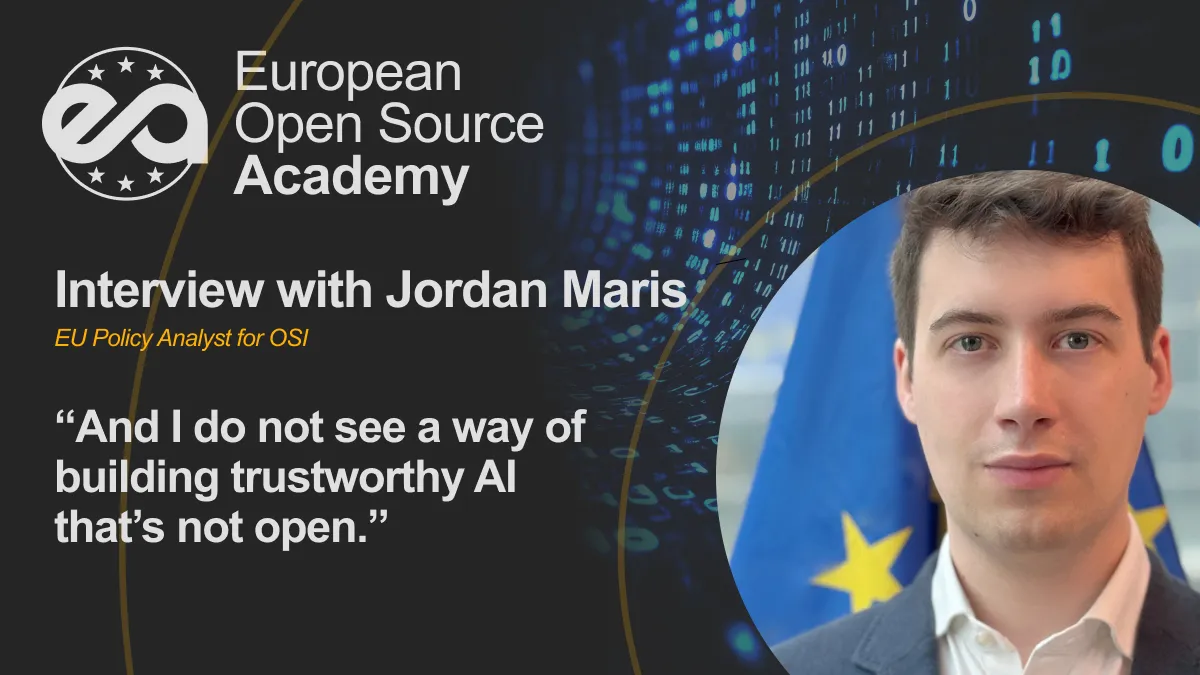“And I do not see a way of building trustworthy AI that’s not open.”
In recent years, European policymaking has changed significantly, especially in terms of its broader recognition of open source technology. We talked with Jordan, a fervent supporter of open source who has experience working at the nexus of technology and policy in the European Parliament and is currently a member of the Open Source Initiative, to support and steer more of this transition.
From Computer Science to Policy Advocacy
Jordan’s journey into the world of open source advocacy is rooted in a lifelong passion for technology. “I started taking an interest in computers when I was very, very small,” he recalls. While initially studying computer science in high school, he soon identified a crucial gap in political understanding of technology. This realisation led him to turn towards political science, studying in France, Germany, and Belgium, before securing a role in the office of a Member of the European Parliament (MEP). For three years, his work focused on tech policy, democracy, and open source, a path that ultimately brought him to the Open Source Initiative.
The Role of Open Source in AI Accountability
Jordan emphasises a key challenge in the development of AI, which is currently highly debated: legal certainty and accountability. Reflecting on his work in the Legal Affairs Committee of the European Parliament, he explains that AI systems often function as “black boxes,” making decisions without clear explanations. “If it's making important decisions, and someone wants to challenge that in court, all you can really say is: we gave it this training data, we fed in this person’s information, and it told us this. That’s a disaster from a legal certainty perspective, but from an accountability perspective, it’s a nightmare,” he warns. His greatest fear is not accidental biases in AI, but deliberate manipulation, where organisations insert biases into AI systems while maintaining plausible deniability.
Open source, he argues, is a solution to this problem: “When you have got that degree of openness about the data that’s used for training, about the architecture of the model […] you can get much closer to understanding the decision-making process.” Especially in the public sector - where AI influences access to healthcare, education and public benefits - this transparency is essential. Even if not all citizens review the code, investigative journalists and data scientists can examine AI systems to ensure their fairness.“If we want to make AI a success, we have to make it trustworthy for people. And I do not see a way of building trustworthy AI that’s not open.”
Open Source Gaining Recognition in European Policymaking
Reflecting on the progression of open source in European legislation, Jordan acknowledges that open source was once an obscure concept to most lawmakers. “If we rewind back like three or four years, open source was something that a couple of geeks in the commission were aware of,” he explains. However, legislative work on the EU’s Artificial Intelligence Act (AI Act) marked a turning point. To foster the development of Open Source AI, Jordan and his colleague Sebastian Raible successfully fought for an exemption for Open Source AI in the law.
This achievement was significant as it marked a shift from ignorance to awareness among European lawmakers. The Cyber Resilience Act (CRA) followed, demonstrating growing intent from policymakers to address open source. Despite initial missteps, Jordan notes, “We went from ignorance to innocence, and now with the way the CRA went down, we’re going from innocence to experience.” The increasing engagement between policymakers and the open source community signals a promising trajectory.
Key Legislative Milestones
Several legislative efforts have played a role in this transformation. Jordan highlights three crucial pieces of legislation: The AI Act, which marked the first formal acknowledgment of open source’s role in policy;The Cyber Resilience Act (CRA), which represented an effort-though imperfect-to integrate open source considerations; and the Product Liability Directive (PLD), which further underscored the necessity of including open source in regulatory frameworks. Looking ahead, Jordan identifies upcoming policies, particularly in public procurement and standardisation, as potential turning points. Facilitating the purchase of open source solutions by public institutions could significantly strengthen the ecosystem.
Challenges in Open Source Advocacy
Even with the advancements, it is still difficult to get open source legislation included in European laws. Jordan claims that the shortage of personnel is one of the main issues. “When I started in the European Parliament, there were about three people doing full-time advocacy on open source in Brussels. That number has now doubled, over doubled. There are seven of us now.” However, compared to corporate lobbying efforts, these numbers remain small.
Another obstacle is the absence of a dedicated group of open source advocates within the European Parliament. Unlike sectors that have clear political affiliations, open source does not fit neatly into any one ideology. Jordan points out, “If you're in the car industry, your first stop is going to be the EPP. If you're an NGO, your first stop might be the Greens or the Social Democrats. For us, there's not one specific group.”
Perhaps the most fundamental challenge is explaining open source itself. To the uninitiated, the concept of developers voluntarily creating foundational technology can seem perplexing. “When you explain open source to somebody who's never heard of it before, you sound like an insane person,” Jordan jokes. Conquering misconceptions about security and affordability remains a crucial part of advocacy in open source.
The European Open Source Academy and Future Prospects
The recent launch of the European Open Source Academy represents a significant step toward greater and broader recognition and understanding of open source. Jordan was particularly pleased with the presence of commission staffers and lawmakers at the event. “One of my core hopes is that in the coming years, there will be more and more lawmakers, more and more staffers in the room for that event,” he says. The academy intends to serve as a crucial platform to showcase the achievements of European open source developers and highlight the role they play in technological sovereignty.
Jordan is optimistic about the future of open source in Europe. With increasing political interest in reducing dependence on non-European technology providers, open source stands to gain substantial support. The upcoming EU budget discussions could also be a pivotal moment, with potential funding for open source initiatives akin to Germany’s Sovereign Tech Fund.
Adapting to European Regulations
As open source continues to expand its (digital) footprint, the community is learning to navigate regulatory landscapes. Jordan describes this phase as a “coming of age” moment. The traditional ethos of open source—developing software freely and collaboratively—remains intact, but there is now a growing recognition that engagement with policy is essential. The community is increasingly focusing on ensuring compliance with laws like the CRA while continuing to advocate for policies that support open source development.
What to expect
The journey of open source in European policymaking has evolved from obscurity to growing recognition. While challenges remain, the momentum is undeniable. As Jordan aptly puts it, “My hope is that now that the commission understands what open source is, now that they’re talking to us, we will be able to get towards that stage where when they’re making a law, they think, ‘Okay, how is this going to impact the open source community?’”
The future of open source in European legislation appears to be more promising than ever because of sustained activism, thoughtful policymaking, and the assistance of projects like the European Open Source Academy.
About Jordan Maris
Jordan Maris is an EU policy analyst at the Open Source Initiative (OSI), where he acts as a bridging force between EU legislators and the open source community. In this role, he monitors upcoming EU policies, educates legislators on the benefits of open source, and represents OSI at EU-wide events and conferences. Prior to joining OSI in September 2024, Jordan was Senior European Parliamentary Assistant to MEP Karen Melchior in the Renew Europe group. During his time in the office, he supported open source software in negotiations on important legislation, including the AI Act, the Cyber Resilience Act and the Product Liability Directive. Jordan is a long-time open source software user and a strong advocate of the Public Money-Public Code principle.

